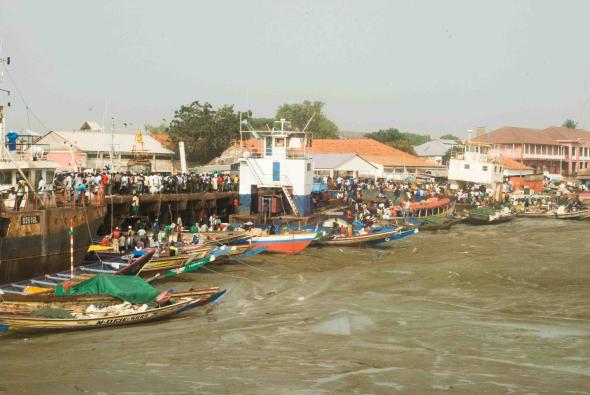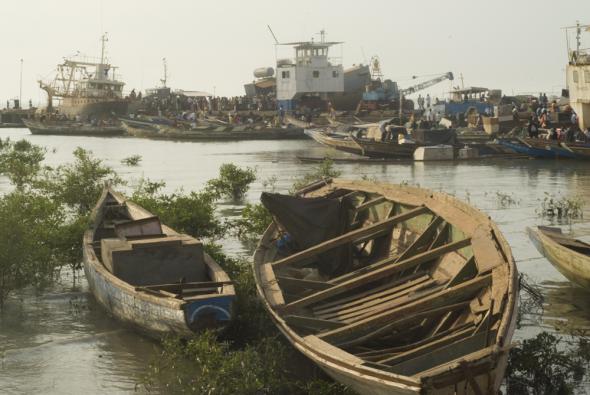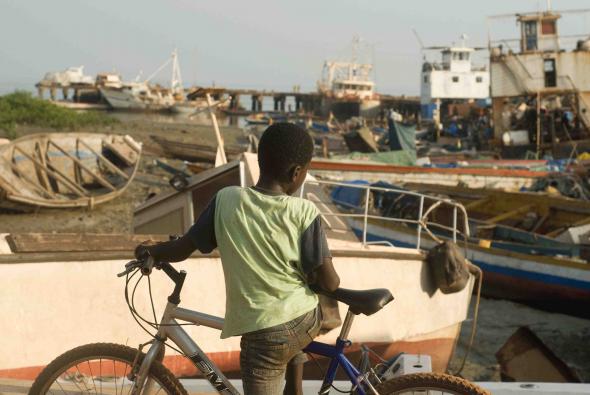Guinea-Bissau: if a boat moored
In July 2009, the campaign for the second round of presidential elections in Guinea-Bissau had been on the streets for a week. But the leading players are not only Kumba Ialá and Malam Bacai Sanhá, but also the people, who reject violence and fear the power of the military and narcotraffickers.*
A Mercedes 190 taxi, blue and white, drives down Guinea-Bissau’s longest avenue, connecting Bissau to the airport. It dodges toca-tocas, blue and yellow cousins of Angola’s candongueiros [passenger vans used as public transportation], and accelerates toward the city. It’s an old taxi, “partly Europe,” laughs the driver, Fernando. “This avenue is called ‘November 14th’, which is when Nino Vieira staged the coup [in 1980]. A few months after he was killed [on March 2 of this year], they removed the old name and said it was now called Avenue of the Homeland’s Freedom Fighters.” “It’s up to them,” he injects, indifferent. A reggae from Lucky Dube plays on a worn-out tape: “It’s not easy to understand it, son.”
The traffic escalates on the part of the avenue blocked by warehouses and the national headquarters of Kumba Ialá’s and Henrique Rosa’s campaigns, the latter of whom is already out of the running. Pedal to the metal toward the center of Bissau, which looks, in many ways, like the cities of Angolan provinces. Geometric lines intact, single-story houses, low buildings, trees on disarranged sidewalks. It is the capital of the sixth poorest country in the world (estimated by “The World Factbook” of the CIA, 2008), but the periphery is far more organized, clean and dignified than the slums that abound in this Luanda “swimming in money,” as many Guineans believe. Anachronisms that give pause.
The blue and white rolls on, and the city surprises those who see it for the first time. In this Bissau, after all, there are also clubs with “muita carga”, where Angolan music is queen; and outdoor cafes and bars where they strum gumbe, the Guinean brother of semba, live. Activity that, even in the middle of a sensitive electoral campaign, goes until the early morning, proving that the military climate typically painted of Guinea-Bissau by international public opinion is not the truth. “Even when there is serious confusion, and they kill this one or that one, we go out the next morning to buy bread in the street,” relates a merchant who does not want to be identified. “They [politicians and the military] do whatever they want to each other, but they leave us alone in our corner.”
On impeccably paved roads, Fernando the taxi driver proceeds by the National Assembly and flows into the square where the old headquarters of the Republic’s President, semi-destroyed since the war in 98/99, displays its ghostly dignity. He leaves behind, to the left, the headquarters of PAIGC, privileged stage of Malam Bacai Sanhá, and descends yet another long avenue. UDIB Sports Club, the Cathedral, the Post Office, the National Elections Commission and the sea. 400 CFA francs (the currency that Guinea-Bissau shares with 13 other countries in the region) and a “thank you”. Up ahead, the port of Pindjiguiti. Waiting to leave
Waiting to leave
Over 55 years later, the historic pier of Pindjiguiti, where in 1959 the Colonial Portuguese authorities massacred 50 Guineans, giving rise to the armed liberation struggle, is still seen as a metaphor for freedom. Of another freedom, theorized in an assertion by the Guinean writer Abdulai Silá, which takes the form of a question on the streets of Bissau: “If a boat moored in Pindjiguiti with the capacity to take all of the youth of Guinea-Bissau, would you board?”
“Yes.” Suaré Baldé, 24 years old. “Yes, I would board.” Aladjé Sanhá, 24 years old. “Yes, everyone would be interested.” Malam Sambú, 23 years old. “Yes. I’m saving money to leave and return when the situation changes.” Alfredo Gomes, 26 years old. “Maybe I will also leave. Much of the middle class and discerning people of this country - intellectuals, artists, doctors - left. I have already seen all of the chaos, am I prepared to watch it yet again?” Kota Flora Gomes, filmmaker. The imaginary boat will be filled with people assailed by this fixed desire to leave - an obsession “deadly to any country,” as University Dean Fafali Koudawo points out, but that has its reasons for being, aside from the clear lack of conditions and basic infrastructures. “In Guinea-Bissau, opportunities are not given to those who are knowledgeable, but to those who politically support the government,” complains the young Malam Sambú. In the same vein, Aladjé Sanhá: “older politicians do not want to pass the baton. We have to be us, young people who are disgusted with the situation, to assume the leadership of this country. But for this, we have to go and study in order to come back and fight to the end to reach our goal. ”
While the group of friends talk, in the back, on the stage of the “Lenox” terrace, girls no more than 15 years old parade around. Some are well dressed. Others have dirty shirts and disheveled, kinky hair. They pose for an imaginary camera. “What do they expect from life?” wonders Alfredo Gomes, entertainer at Radio Pindjiguiti. “Since the recent events [the death of Nino Vieira and other political figures] I have almost lost any hope of continuing to live in my country. Here, the honest live poor, and I want to continue to be honest so my children don’t point the finger at me tomorrow. If I stay here, either I continue without anything, or I join a wave of corruption and I have something more, but I lose my honor. ” Gaze fixed, very serious.
In the Guinean people, this sense of integrity is widespread and impresses those who arrive in the country full of prejudices built on the echoes of that which comes into the world about Guinea-Bissau. Constructed ideas that fall to the ground upon first contact with ordinary people, the day-to-day. “These people are very peaceful, warm and simple”, and “are unfairly labeled as violent because of the image that a small group of politicans and soldiers put out there”, remarks the activist Macária Barai. “If the Guineans were as violent as they say, they would have long since gone into the streets to protest,” notes Flora Gomes.
It is also a people of staggering despair, which “still does not understand how their country has reached this point,” adds Barai, and that “must also take the blame for their current situation, because the country is also he who makes it,” argues Fafali Koudawo. “If, at the time of struggle against colonialism, in which Guinea-Bissau was an example for all Africa, they had told me that 30 years later I would be questioning whether this is where I want to live, if this is where I want to spend my last years, because I don’t believe anymore… when I put this into question…” Conclusion suspended in the silence of Flora Gomes.

Funje of cocaine in Bijagós
“We, Guineans, we are very good at inventing rumors,” says Flora Gomes, between smiles. One of them captured in an informal conversation: “One day, some packages washed ashore on a beach in the Bijagós islands. The people who lived there collected it, not knowing what it was. When they opened it, they found a kind of white flour. They were all happy and made some porridge that the whole community ate. Conclusion: they slept for a week! It was cocaine!” General laughter.
Although anecdotal, this “story” is very serious. Drug trafficking is undermining Guinean society and stamping in red, above the name of the country, the label “narco-state.” The recent wave of political killings, which began March 2 with the deaths of the army’s chief, General Tagme Na Waié, and the President, Nino Vieira, and culminated on June 5 with the liquidation of presidential candidate Baciro Dabó and deputy Hélder Proença, raises the question: to what extent are the drug traffickers installed in Guinea, which U.S. experts say is linked to Colombian guerrillas, broadening the political instability in the country?
Fafali Koudawo, political commentator, believes that these deaths were, above all, “a settling of accounts”, which also “served political goals.” “Drug trafficking is only a catalyst, because it brings more resources and new players - the traffickers - who seek alliances with circles of power to thrive,” he infers. An opinion that goes against a recent statement by Antonio Mazzitelli, representative of the UN’s Office on Drugs and Crime in West Africa, for whom the death of those leaders was essentially rooted “in personal disputes,” and not in the alleged involvement in drug trafficking .
But some see the situation differently. In a communication to the U.S. Senate, on June 23, Under Secretary of State for African Affairs, Johnnie Carson, was adamant: “We believe that the President and the General were killed in large part due to relations they had with the financing and dealing of drugs. ” Referring to Guinea-Bissau as the “first narco-state” in West Africa, Carson stressed the scale of the problem with one significant detail: “The country’s GDP is equivalent to the value of six tons of cocaine, which can be transported within one to two months.” Ten years without diplomatic representation in Bissau, the U.S. announced two weeks ago the highest priority in the opening of an embassy of a “certain size” in this country.
Vladimir Monteiro, spokesman for the UN mission to Guinea-Bissau (ONUGBIS) states, in the same register, that drug trafficking is a problem of “all of West Africa,” but that the Guinean state is the most affected due to “its weakness and poverty.” The official also says that ONUGBIS “has alerted authorities to the danger of drugs entering the public, social and political circuit of the country.” “If it happens, it would have proportions that we can not predict,” he believes.
In the Guinean perception, this danger has long since leaped into the realm of possibility. “The apparent freedom with which traffickers operate in the country” raises suspicions about a possible “high degree of complicity in high circles of power,” said various members of civil society, such as Macária Barai. Accusations reprised by Suaré Baldé, coordinator of the Strategies for the Disarmament of Violence Association, which operates in Bairro Militar, considered the largest shopping center of drugs in Bissau. According to the youth, “everyone can point out a person suspected of having ties to drug trafficking,” although “no one can provide evidence.” “We see things that surprise us - people who came from nothing and now have a lot,” testified, in turn, Flora Gomes. Such as Hummers, which pass quite frequently in the Guinean capital’s streets and are targets of suspicion by all.
The NJ [Novo Jornal, the Angolan newspaper where this piece was originally published] tried to contact Lucinda Barbosa, director of the Judicial Police, but according to information gathered on site, he was absent from the country “indefinitely.”

New covenant and the military
These presidential elections “are the most dangerous ever in regards to the management of post-election period,” warns Fafali Koudawo. “The future president must gather consensus, or else the political crisis will deepen,” he predicts. This consensus, in addition to the civil authorities, must include the military, a key player in Guinea-Bissau. “They contributed to the liberation struggle, they feel more legitimacy than the political power, and therefore undervalue all of the authority that comes from the polls,” says Koudawo, adding: “Even the young military personnel take advantage of this historic capital.”
“We have an army that never wanted to accept the democratic era,” jabs, in turn, Luís Martins, president of the Guinean Human Rights League (LGDH). On the other hand, says Macária Barai, “the marriage between the military and the politicians to achieve power” meant that Guinea would enter “into a cycle of coups and assassinations that have made the state fragile.”
Although Zamora Induta, the current acting head of the Armed Forces, is not any sort of consensual figure (the former head of Government, Francisco Fadul, accused him of having planned, together with the Prime Minister, Carlos Gomes Júnior, the deaths of Nino Vieira and the former army chief, Tagme Na Waie - a hypothesis rejected by the accused), he is seen by some sectors of society as someone capable of cleaning house in an army that cannot escape suspicions of involvement in drug trafficking. But “the fear that infuses the Guinean military is real,” recalls the president of LDGH. A fear that, defends Luis Martins, “underlies the refusal by the country’s politicians of having an international force of peacekeepers sent to Guinea-Bissau.” “Political power would have to allow the arrival of forces, which is unable to do, because it could suffer reprisals from the military,” he says. The discussion of this idea, defended by civil society, was strong in the beginning of the campaign, but ended up collapsing.
We had an interview scheduled with the spokesman of the Armed Forces, Samuel Fernandes, who did not attend the meeting. Up until our return to Luanda, it was not possible to make contact.
Photos by Catarina Laranjeiro
* Report published in Novo Jornal, Angola, 07/17/2009, one week before the second round of the Presidential election in Guinea-Bissau, won by Malam Bacai Sanhá.